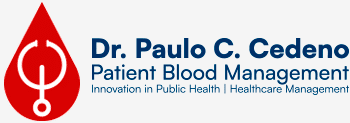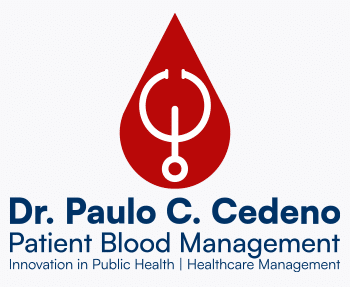Specialized Medical Services
Patient Blood Management (PBM) is an advanced medical approach that aims to optimize patient health before, during, and after any treatment or surgery, avoiding unnecessary transfusions. Through evidence-based clinical strategies, we help preserve the patient’s own blood, improving recovery, reducing risks, and respecting their decisions.
Health Services Management
With training in medical management, we apply healthcare administration principles to achieve efficient, ethical, and patient-centered care. This allows for better integration of clinical services, reduced waiting times, and ensures timely and compassionate care.
What does it involve?
- Effective organization of healthcare resources.
- Coordination between medical specialties.
- Continuous quality improvement in clinical processes.
Transfusion Medicine.
Transfusion medicine focuses on the safe, ethical, and justified use of blood components. It ensures that each transfusion, when necessary, is supported by clinical evidence, informed patient consent, and a detailed assessment of risks and benefits.
Services offered:
- Clinical indications for transfusion.
- Monitoring of transfused patients.
- Education about clinical alternatives to blood product use and informed consent.
Medical Audits
We perform quality medical audits and medical billing audits, which involves health quality reviews aimed at identifying improvements in medical care and ensuring compliance with international standards.
Applications:
- Evaluation of medical records.
- Assessment of medical bills.
- Monitoring of transfusion practices.
- Detection of adverse events and continuous improvement.
- Development of corrective action plans.
Continuing Medical Education and Training
We participate in continuing medical education and training programs, contributing to the strengthening of competencies in the healthcare field. We promote continuous improvement processes, encourage the adoption of new educational methodologies, and foster academic excellence in healthcare.
Services:
- Courses and certifications in hospital quality and healthcare management.
- Training and research programs applied to healthcare services.
- Integration of simulation and digital learning programs.
Clinical Strategies
Patient Blood Management (PBM) is an evidence-based medical strategy that aims to optimize the patient’s own blood and reduce unnecessary use of transfusions. Ideally, it is implemented during three key stages of the clinical process: before, during, and after an intervention, especially in surgical procedures. However, it can be initiated at any of these stages, depending on when the patient enters the healthcare system.
PILLAR 1
Preoperative Phase
This phase aims to prepare and optimize the patient’s condition before surgical intervention, ensuring their safety and promoting the best outcomes.
Key actions:
- Diagnosis and treatment of pre-existing anemia: especially iron deficiency or chronic anemia.
- Oral or intravenous iron replacement, vitamin B12 or folic acid according to the cause of anemia.
- Coagulation assessment: detection and correction of coagulation disorders.
- Patient education: informing about the procedure and blood management strategy to improve adherence.
- Surgical planning: selection of the optimal time for surgery and adjustments according to the patient’s hematological status.
Key Actions:
Less invasive surgical techniques or those with minimal blood loss.
Rigorous control of hemostasis: actively preventing and managing bleeding.
Use of technologies such as cell salvage (Cell Saver), viscoelastic-guided coagulation, and local hemostatic agents.
Close monitoring of vital signs and blood volume.
Avoidance of unnecessary transfusions, using rational and personalized transfusion thresholds.
PILLAR 2
Intraoperative Phase
During this phase, which occurs throughout the surgery, the primary objective is to minimize blood loss and ensure the proper progression of the procedure.
PILAR 3
Postoperative Phase
During this period following the procedure, efforts are focused on promoting the patient’s hematological recovery and reducing the need for transfusions.
Key Actions:
Monitoring and treatment of postoperative anemia.
Iron therapy, erythropoietin, or other supplements if necessary.
Control of postoperative bleeding and active monitoring of complications.
Promotion of early functional recovery, as prolonged bed rest can worsen anemia and other risks.
Need a personalized evaluation?
If you are looking for safe alternatives, wish to avoid unnecessary transfusions, or simply seek a second medical opinion, please do not hesitate to count on me.
FAQ
Frequently Asked Questions
Here you will find answers to the most common questions about our services.
What exactly is Patient Blood Management (PBM)?
PBM is a patient-centered, systematic, and evidence-based approach to improving patient outcomes through the proper management and preservation of the patient’s own blood, while promoting patient safety and empowerment.
Is Patient Blood Management appropriate for all medical cases?
Yes, the principles of PBM are applicable to surgical, medical, obstetric, and pediatric patients. Each treatment plan is customized based on the specific needs, medical conditions, and preferences of the patient, adapting to different clinical scenarios.
How is a case managed when the patient has restrictions regarding transfusions?
We fully respect the patient’s informed consent in accordance with Ministerial Agreement 5316, Official Register 510, dated February 22, 2016, Quito – Ecuador.
In such cases, we implement advanced strategies such as preoperative hemoglobin optimization, minimally invasive surgical techniques, cell salvage, and other alternative treatments, always within the framework of current legal regulations.

